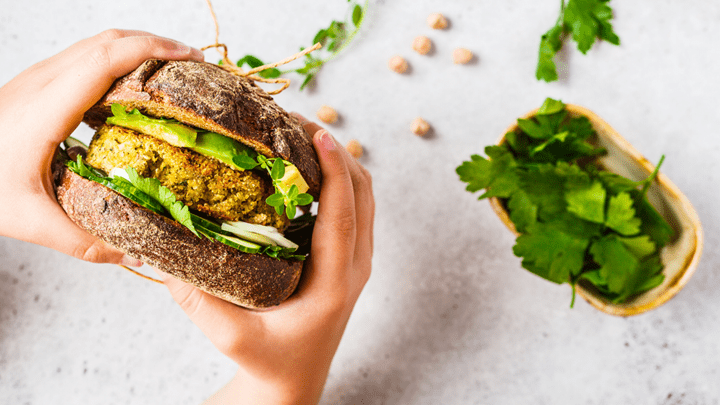by Maria Crokos
Greek Orthodox Lent is a time of fasting. The rules are pretty simple: abstain from foods that contain animals with red blood (meats, poultry, game) and products from animals with red blood (milk, cheese, eggs, etc.). Not so easy for you meat lovers out there. 40 days sans meat. Oh no! Thankfully we have an explosion of plant-based companies like Beyond Meat and Impossible to your rescue. Have meat, without the meat! You probably assume it's healthy, too (after all…it is plants!). But it’s not… Not even close. For food that boasts about being “plant-based”, actual vegetables are suspiciously absent from most ingredient lists.
Marketing has led us to believe that “plant-based” burgers consist solely of that—plants. However, the products specifically designed to mimic the texture and flavour of meat contain an extensive ingredient list that’s at odds with the better-for-you image these foods are trying to create. We’re being duped into eating heavily processed food that contains numerous preservatives, additives, fillers, texturisers, and chemicals linked to cancer. They’re high in sodium, and low in nutritional quality. Consumers should NOT be told that highly processed fake foods are any better for you than the meat products they’re replacing.
As a certified health coach, I often get asked if these plant-based burgers are good for you. If you spend time reading and understanding your food labels, you should reconsider the world of fake meat.
 Let’s take a look into some of the ingredients that may be found in either burger brand:
Let’s take a look into some of the ingredients that may be found in either burger brand:
1) Methylcellulose is a thickening agent, which also happens to be the active ingredient in many laxatives. It might explain why so many people report digestive trouble after eating alternative meats. Warning: It might explain why so many of these burgers have you running to the bathroom!
2) Soy protein isolates and concentrates are separated from their parent plant through a process called extrusion, which uses a petrochemical solvent to separate proteins from oils. This method is particularly concerning because the FDA does not monitor chemical residues in the final product.
3) Cultured Dextrose is produced by culturing sugar with bacteria. It’s marketed as a “more natural” way to preserve, sweeten, or texturise processed food. Cultured dextrose has been linked with numerous side effects, including upset stomach, fatigue, and increased thirst.
4) Yeast Extract is used as a flavour enhancer due to the natural presence of monosodium glutamate (MSG), which disrupts the signalling effect of the hormone leptin in your brain. Leptin is in charge of telling your body that you’ve had enough to eat.
5) Natural flavours often aren’t derived from the food they are mimicking, and they can be contaminated by trace amounts of undesirable chemicals that occur naturally in a plant and animals.
6) Soy lecithin is extracted from soybeans or using a solvent called hexane, which is a known human neurotoxin and suspected of damaging reproductive and fetal health. Most hexane is evaporated off, but small amounts remain in the final product.
7) Canola and/or sunflower oils are heavily processed vegetable oils. These seed oils are highly inflammatory and contain Omega 6s, which is linked to chronic health issues like obesity and diabetes.
8) Soy leghemoglobin, a genetically engineered colour additive to mimic the blood found in real meat. Dubbed as “GE heme” it’s new to the human diet and we are yet to see what the health effects are on this ingredient.
Rather than offering healthy food that’s made with greens, nuts, beans, or literally anything good for you, these companies are getting ahead by using the phrase “plant-based” to convince us that their faux meat burgers, sausages, and bacon are healthier than the meat products they’re trying to replace. You shouldn’t have to trick people into buying your products! By cultivating a health halo around “plant-based” foods, these companies are undermining peoples’ genuine efforts to get healthy.

Here’s my wellness tip: Opt instead for a portobello mushroom burger or make your own plant-based burgers using whole foods like grains, beans and vegetables.
Fasting is a time of reflection and refocus. Why not take the opportunity to do the same on what goes into your body?
For more wellness and nutrition tips follow along @wewelltogether
Maria Crokos is a Certified Holistic Health Coach living in Montreal, Canada. She earned her certification
from the Institute of Integrative Nutrition, the largest globally renowned nutrition school in the world. She is
an advocate for women’s health, clean eating, especially for children, and how to live an overall healthy lifestyle.
@ wewelltogether
www.wewelltogether.com
Read also How To Answer the Age-Old Question, “What’s for Dinner?”


